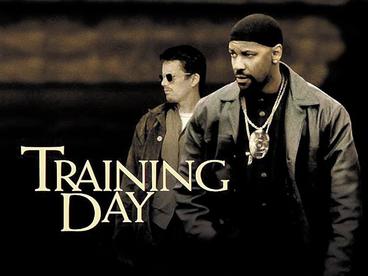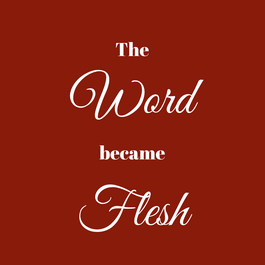 Training Day premiered during my sophomore year at Orrville High School. Mashing up Denzel Washington and Ethan Hawke in a police drama struck the right chord with this budding pubescent demographic. Action, purpose, the kid from White Fang and everyone's favorite actor from Pulp Fiction coalesced in ways that enticed our teenage sensibilities. Of course, the content - the violence, the language, the drugs, the concepts of grey areas in justice - were all beyond us as an audience, but like Hawke's character, we became apprentices to a caricatured version of LA. Preaching is Training Day every Sunday for the church. Instead of an overemphasized version of Orange County's flaws, however, we're trained in the otherworldly language of the church. Two of my church history professors, Warren Smith and Sujin Pak, spoke of the importance of learning the language of our faith. For Dr. Smith, the language of the early Christian fathers and mothers held great importance because those words, found especially in creeds, revealed the agreed upon theological foundations of the faith. For Dr. Pak, the language of the Reformation showed us how Christians wrestled withe tradition while meeting the unforeseen realities of a brave new world. In both instances, the language they used, which still forms the ways we think about God, faith, church, mission, discipleship, and creation, still matters. In one sense, preaching should train us with the language of our forebears. In quite another, though, preaching trains us in the language of scripture, and especially the scriptures that don't fit nicely on bumper stickers and memes. Sermons properly arise from a preacher's personal wrestling with the Bible, and that struggle ought to compel the congregation into their own engagement with God in God's written word. Some might here argue that we should use a single translation of the Bible so we can have a singular memory of certain verses. After all, do we walk through the valley of the shadow of death or the darkest valley in Psalm 23? However, that's not at all what I believe is important about learning biblical language. Rather, learning the content of the Bible gives us the language to make sense of the world in which we live. However you translate Psalm 23, we hear a promise of a God who walks with us through times of anxiety, fear, and tragedy. We hear of a God who feeds and feasts us even in the face of enemies. That language, in whatever variations, now give us powerful words to speak to church communities facing tragedies like our recent natural disasters of hurricanes, wildfires, and earthquakes in the Northern and Western Hemisphere. While the movie sensationalized the violence of city life, preaching should train congregations in honesty. Honesty about the challenges we face and the triumphs we experience. Honesty about the sins that plague us and the forgiveness that saves us. Honesty about the difficulty of living God's justice in our world and the resolute commitment that God has for justice anyway. This is honesty about God, about us, about creation, about all things. Even as preaching trains us in holy language, it should not train us in sterile language. We should remember that words like "shit" appear in the Bible (Phillipians 3:8). Rather, preaching should train us in honest language. Words of lament and righteous anger should appear in the pulpit alongside words of thanksgiving and hope. Preaching is ultimately the comingling of the language of God's Kingdom with today's vernacular speech. Too much Kingdom language and all we'll hear is a foreign tongue. Too much familiar language and there's nothing that sets a sermon apart. Perhaps most importantly, like Denzel in Training Day, preachers are complicated characters. While we're proclaiming the Gospel of grace and exhorting God's people to saintly life, we stand before these people as sinners. We're held to a higher standard and yet know our own faults too deeply, too intimately. We're enacting God's grace before the eyes of God's people: sinners made saints leading congregations full of sinners made saints. Any preaching that doesn't acknowledge the fallibility of the preacher isn't Christian preaching. Any preaching that elevates the preacher to a pedestal breaks the second commandment (idolatry) and obscures the ultimate content of the sermon: God's very self. We're not to point to ourselves. We're to point through ourselves to the God about whom we speak, in whom we live and move and have our being, for whom we preach. If you're coming to church, then, don't just look for a "good message." Look to be trained. Give the sermon your close attention and listen for how God is calling you to shape your life as a disciple of Jesus.
0 Comments
 One of the reasons that many people want to create worship experiences without preaching is because we live in a society "dominated by words." That concept first appeared to me in Jonny Baker's Curating Worship, a book that argues we should design worship events to include many more modes of engagement that preaching, speaking, song, and the limited amount of visual art and nonverbal music that appear in many churches. Baker's not wrong that words have taken an overwhelming precedence in our society. Jay Gamelin, a Lutheran pastor and speaker, talks about how the modern world, up to the verge of the 21st century, was a "tell me" culture. Education, knowledge, even belief itself were supposedly founded upon what we were told. However, as Jay points out, we've turned toward a "show me" culture, where people have become less bound to words and more enchanted by images. The rise of picture- and video-based social media offer a small example. That Facebook, where people go into multi-paragraph diatribes, is losing ground to Twitter, where your commentary is limited to 140 characters, and Instagram, based entirely upon photographic media. Of course, that's why Facebook bought Instagram, to ensure a stake in the next evolution of social technology. With this all being true, it's even more understandable why people seek to suppress preaching. We're weary of words. We're also likely weary of words because words have been so often used to hurt, especially words from self-identified Christians. Sometimes they're painful because of the hate couched in religiosity, like we see from Westboro Baptist. At other times they're hurtful because they're false promises, like we find in the Prosperity Gospel. Perhaps most often, though, it's the ugliness of sin that we see in even the best of of Christians. Our hypocritical behavior might be magnified by stories like The Handmaid's Tale, but the presence of sin covered in Christian frosting is no less insidious for us and the culture around us. So why preach, even still? We use our words to talk about our God because our God is a word, and in fact, The Word, that created all good that exists. Our words are limited and often feeble when compared to God's unlimited goodness, but through our words, we connect to God's Word. Of course, words aren't the only way we connect to God's Word, but they're a unique way that we connect with God. Many creatures (rocks, soybeans, water) have no language at all, while other creatures communicate within their species to a certain extent, though in typically less complicated version than humans. Words, it seems, are connected with the evolutionary progress of our brains as a species, which means we've a capacity to engage with God that likely no other creature does. We should use that capacity, and preaching is a formative way the church has done that in the past.  Words used well are the heartbeat of God's love in our lives. Of course, just because we used to do it doesn't mean that we still should. That's where we ought to take seriously the arguments of those like Jonny Baker. The barrage of verbiage we face in worship likely hits the ear of a postmodern 23 year old quite differently than it did of someone the same age in 1617. Our attention spans are shorter today than ever before and yet we're more captivated than ever with images on screens: in our houses, on our desks, in our pockets, and on our wrists. If we want to communicate the person and presence of God to our culture, we must communicate in ways that make sense. Fewer words and more paintings, more videos, more dance, more theater, more sensory stations, seems to introduce the possibility of more people engaging with God more deeply. That's a good thing. But neither should we throw out words entirely. There will forever be nerds (like me, admittedly) who find sermons and prayers, as well as the sung and spoken portions of liturgy, compelling. More importantly, though, we must remember that our God is a God that speaks creation into being. There's a performative power with God's words, words that do what they say. If we ignore words in our worship, we're likely to forget the power of words in our lives. That heartbeat of love that we discover in God's Word brings inspiration for new life. That pulsating reminder that, even when we're alone, we have our words, tells us that we're never alone. The Word who gives us words is with us. We should continue to preach in the "show me" culture, but we shouldn't just preach. That's the wonder of John 1:14; "The Word became flesh...". God's Word did something more than speak. God's Word came into being in history. God's Word acted to bring health to the ill, homes to the homeless, full bellies to those who hungered, forgiveness to the sinners, community to the outcasts, reconciliation to the divided. God's Word never stopped at speaking. So we ought to continue to preach as a church. This is most certainly true. But we ought to take much more seriously what comes next. If faith without works is dead, then preaching without activity is pointless. The Word of God acted on our behalf, literally enfleshed the fullness of God's sermon into the life of creation. That's the paradigm in which we preach as Christian proclaimers. Anything less doesn't belong in worship.
In a culture that's driven more by images and icons, the importance of preaching is understandably called into question. Many of my friends communicate in memes and GIFs more than even text messages. We've gone from verbal shorthand (instead of typing "are you serious," people will type type "r u srs") to culling even more langauge from our vocabulary. With every image-based communication, it seems we're all just, well, this:
If our peers so commonly communicate without words, then why should we continue to preach? What's the point of speaking words about God to God's people?
Preaching matters, not because we've always done it that way, but because with our words we connect to God's Word in a unique way. This doesn't mean that preaching always does the job better than images; in fact, the church developed icons and symbols. This doesn't mean that preaching does the job better than music; indeed, we have scores of songs of all sorts built for the life of the church. It doesn't mean preacher does the job better than service; certainly an embodied Gospel lived in our every day lives makes all the difference in our work places, our homes, our schools, our parks, our politics, and throughout our social existence. All these things do something that preaching can't do. And the converse is also true. Preaching (and other purely primarily verbal forms of faith like prayer) does something that these different expressions of faith can't do, not on their own. Preaching, at its best, helps us to examine our faith, to critically engage the entirety of our religious experience, from ancient text to present experience to future hope. Preaching matters because it's the locus of the church's communal continuing education. We reflect on God's actions on our behalf, as well as on our actions in response to God, and then are sent to encounter God and the world in all sorts of forms beyond preaching. Preaching is not the whole experience of divine communication, but it is certainly a part. With that in mind, the next few post will be a loosely organized series around preaching matters. Why I believe preaching still deserves a regular place in Christian worship. Features on certain preachers and what makes their preaching meaningful. Suggestions on how to engage preaching, even if it's not the best sermon you've ever heard. One way to illustrate the importance of preaching is to imagine a relationship. Imagine you're in love with someone. They bring you flowers. They rub their shoulders. They write letters. They introduce you to their friends. They play you songs. They can speak but they don't speak. They never say, "I love you."* We're left wanting for those words, those declarations and explanations of the relationship we have. We're left hoping for exhortations and inspirations based in that love. We're left wanting for a voice, whether a whisper or a shout, to connect us with the heart of our beloved. That's why preaching is important. Preaching, at its best, communicates the love of God to the church and the world, making that love blossom and grow all the more. Do you think preaching matters? I'd love to hear from you in the comments or via email. *Of course, there are some people in our lives who don't have language ability. These people aren't less loving because they can't communicate. In fact, they're often better than people who can speak at showing their love with actions and behaviors! The point here is that, when we have a certain means at our disposal and don't use those means, then we're left without the fullness of possible experience. One of the people I work with at our church is nonverbal, and while she doesn't speak her love in language, she shouts it with the voice that she has. I'm thankful for that, and it's no less valid than those who use words. |
AuthorSimultaneously a sinner and a saint. Archives
September 2020
Categories |
 RSS Feed
RSS Feed